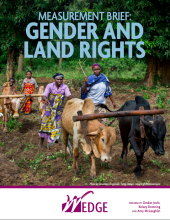Land Library
Welcome to the Land Portal Library. Explore our vast collection of open-access resources (over 74,000) including reports, journal articles, research papers, peer-reviewed publications, legal documents, videos and much more.
/ library resources
Showing items 1 through 9 of 17.ABSTRACT African culture and tradition on matrilineal land ownership are on the verge of disappearing. Land ownership in rural communities remains an important cultural dimension to secure livelihoods, economic growth, and sustainable development.
Governability Of Customary Land Tenure Institutions: Insights From Odupongkpehe Customary Area In Ghana
ABSTRACT Context and background Zambia has grappled with implementing the land titling from 2017 when it started the piloting of the National Land Titling Programme through the seventh National Development Plan (2017-2021).
Gender and land rights are closely intertwined with each other. Globally, more than 400 million women work in agriculture. Women comprise 43 percent of the agricultural labor force in developing countries, yet they account for less than 20 percent of landholders (FAO 2011).
This paper considers the foundations of contemporary African urban economies and how these intersect with the evolution of urban politics, carving a route through a wide range of existing literatures relevant to the politics and political economy of African urban development.
In the next 30 years, Africa’s population is expected to double, and the continent will be home to 2.5 billion people. Almost half of this population will be living in urban agglomerations.
Foreign land grabbing is acknowledged as a phenomenon that generates disempowerment and dispossession of local farmers, human rights violations. Previous studies have revealed the lack of ethical benchmarks in foreign large-scale land transactions that raise moral concerns.
Describes how inclusive technology;a gender-responsive documentation process and shifting gender norms are empowering women through secure land rights. Includes recognising women as landowners;leading by example;securing land;securing futures.
Early-successional habitats (e.g. grasslands, shrublands, and early-successional forests) and their associated wildlife are declining throughout the northeastern United States.






